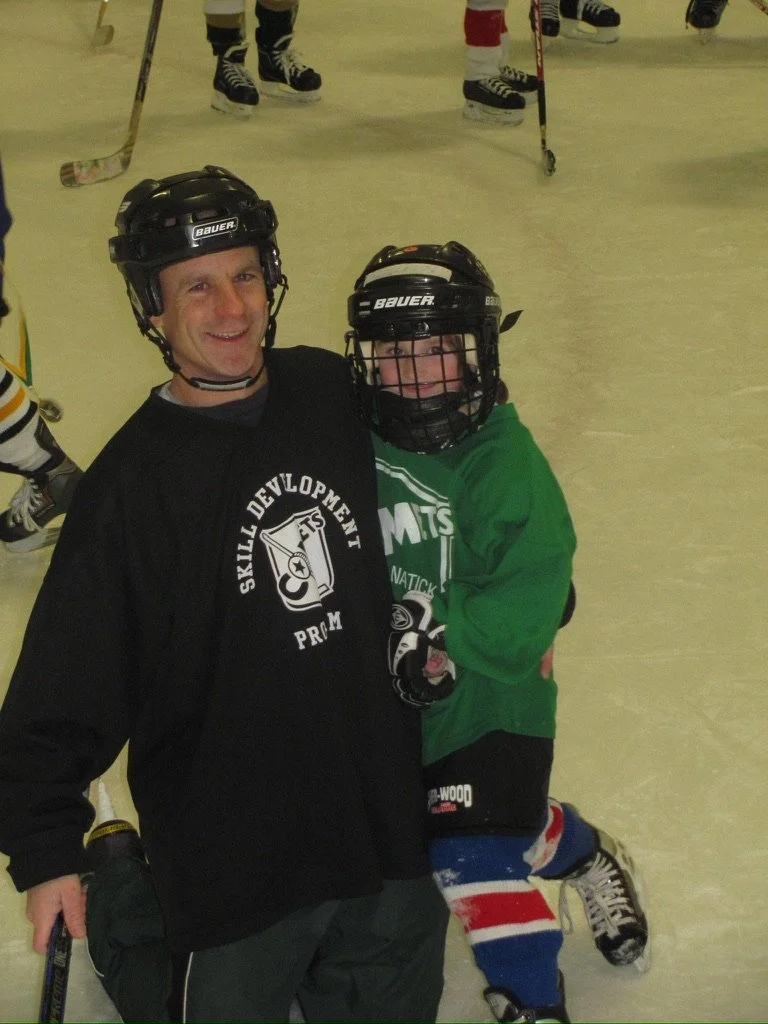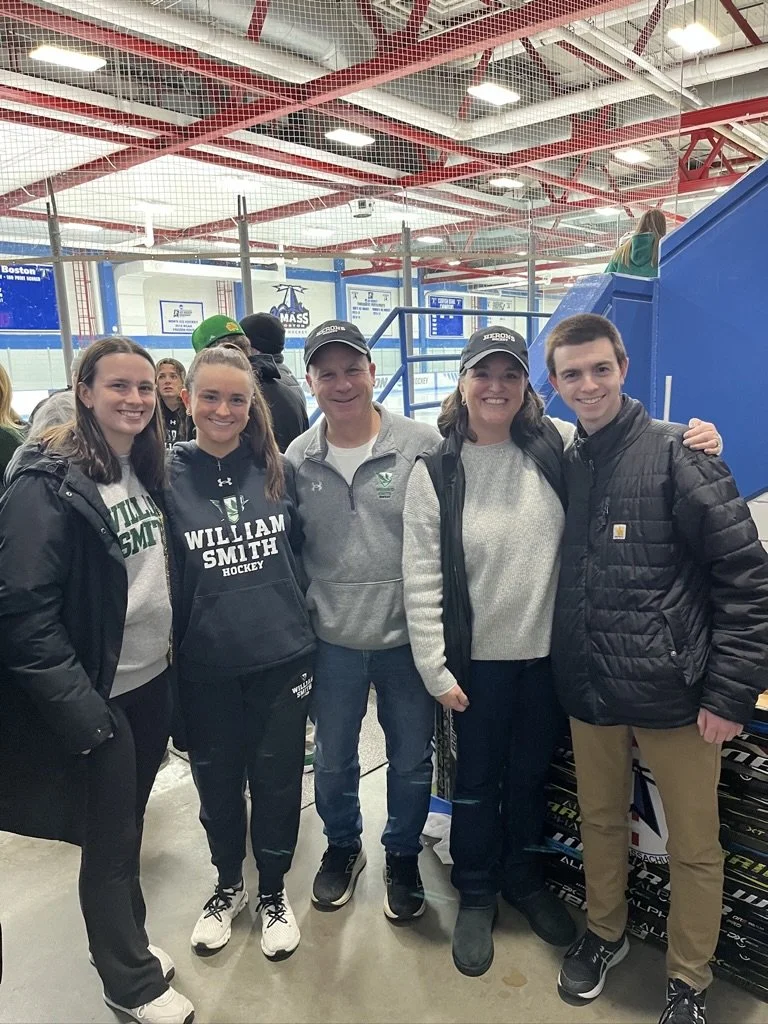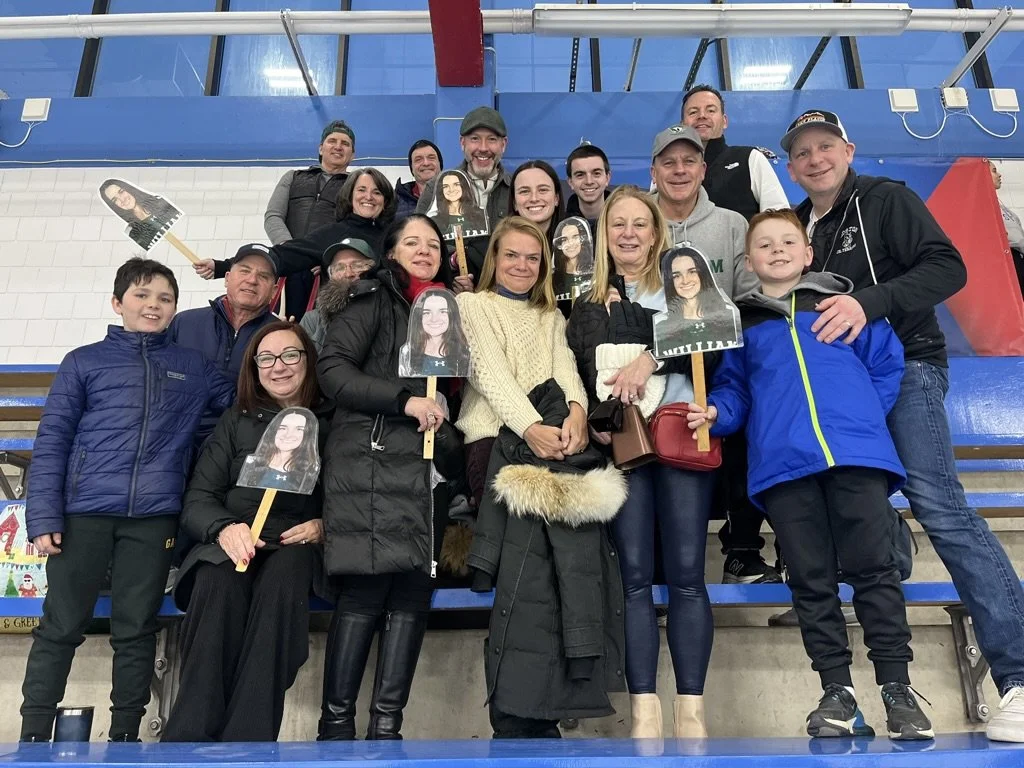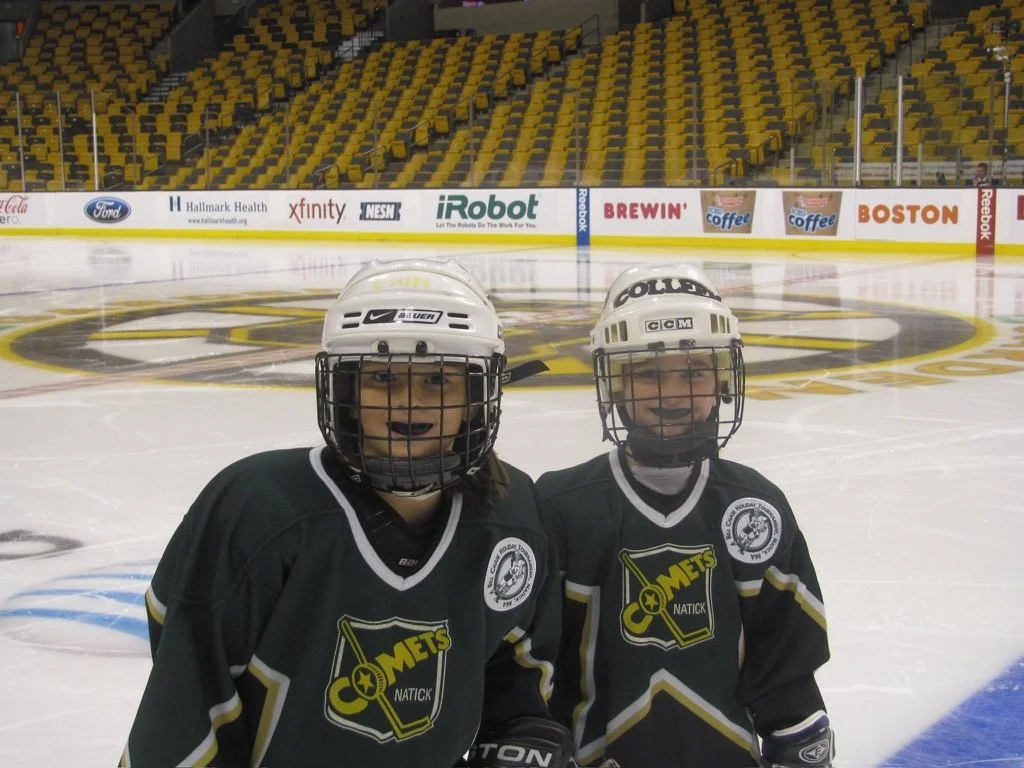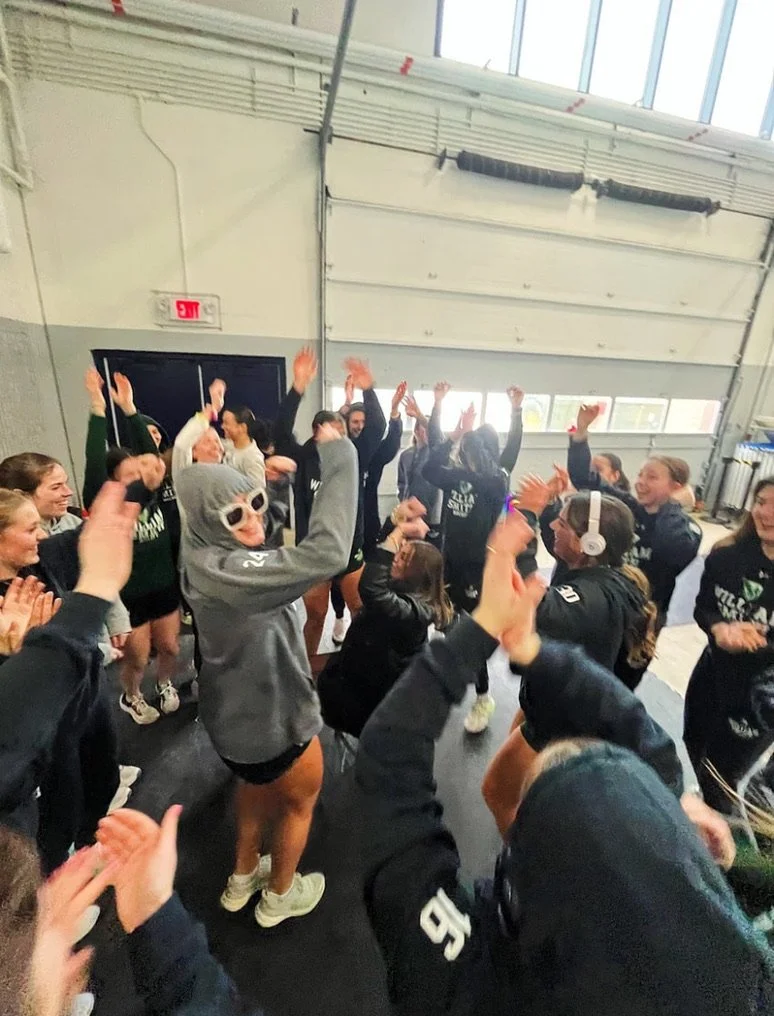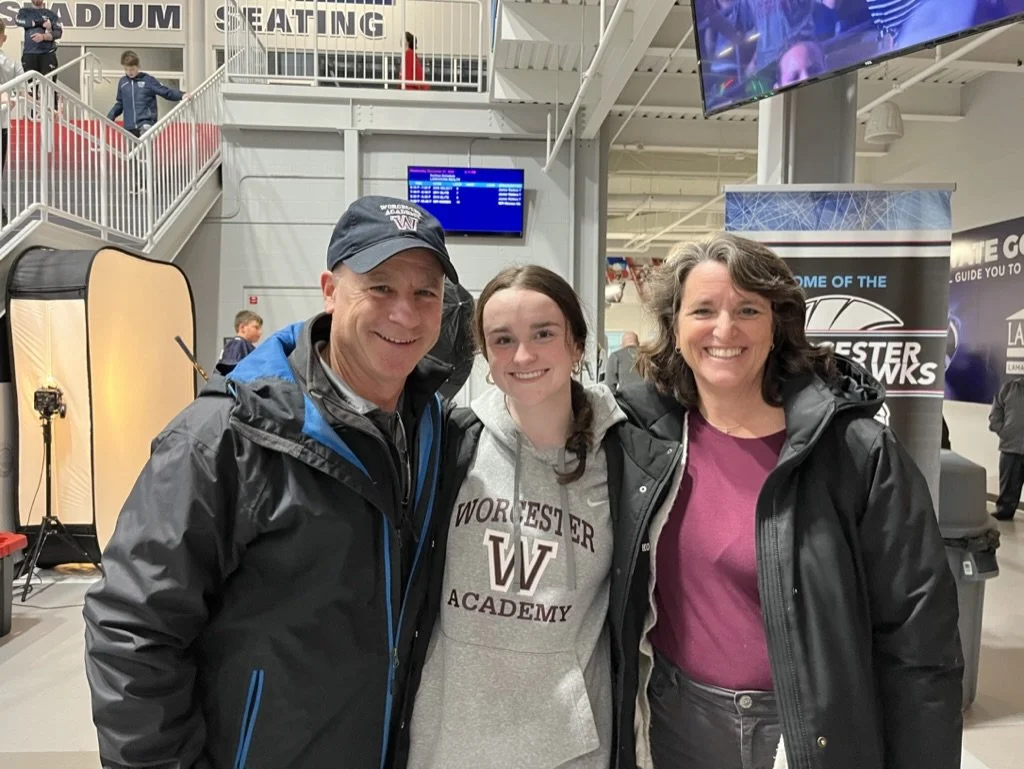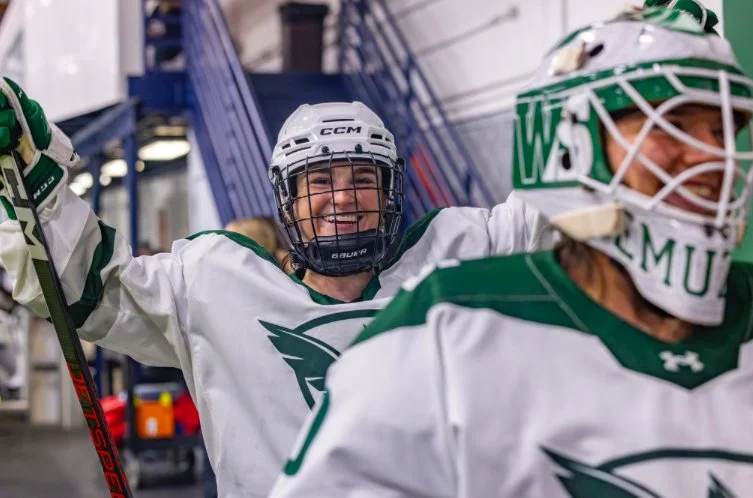Skating on Shattered Ice: A Student-Athlete’s Fight to Feel Worthy
By Colleen Quirk | IG: @colleenmquirk & @heronhockey
I’ve always hated losing—not just in sports, but in everything. Competing was how I made sense of the world, and winning felt like breathing. It wasn’t about being better than others—it was about proving I deserved to be there.
My love for hockey started before I could even spell the word. My dad built a rink in our backyard when I was little. That’s where I learned how to skate—just me, my dad, my siblings, and the cold air. He coached me up until college. Even now, though he’s not behind the bench, he’s still in my corner every single day. His belief in me has never wavered. My Mom has been by my side through it all as well, there is never a day I feel unsupported. Her positivity is what keeps me going when my head tells me to give up.
And my entire family, they drive over five hours—five hours—just to see me play at my college ice rink. That kind of love, that kind of commitment…It's the reason I’ve gotten through everything I thought I couldn’t.
When COVID hit, hockey disappeared overnight. I couldn’t train physically, so I turned inward. I started focusing on the mental game. Journaling became my anchor. When rinks opened back up later in 2020, I applied the knowledge I learned during the pandemic and began writing after practices, and after games—breaking things down, making sense of the chaos, and trying my best to remain in a positive headspace, regardless of mistakes. Slowly, I learned how to manage pressure better. I became more mentally aware and emotionally honest. Or at least, I thought I did.
But there was a pain inside me that no journal entry could fully explain or fix.
I’ve had a chronic back injury since I was 12 years old, one that forced me to narrow down my five sports to just one; hockey. It comes and goes unpredictably. One day I’ll feel 90% fine, and the next I’ll wake up and not have feeling in my legs. The pain itself is awful—but the not knowing when or why it’ll strike again–That’s the part that broke me.
The summer before my freshman year of college, after barely finishing my postgraduate season at Worcester Academy, the pain was so bad I had to use a cane to walk at points. Moving into school, my roommate had to lift me into and out of bed. I was 19 years old and felt trapped in a body that betrayed me almost every morning. This setback made me completely lose myself, as I didn’t know who I was without hockey.
I was warned: if you play again, you could be paralyzed.
But despite the warning, I couldn’t let go. And thankfully, I wasn’t alone. I was blessed with incredibly dedicated athletic trainers, coaches, strength and conditioning staff, and teammates at Hobart and William Smith Colleges (HWS) to make my eventual return to play a lot smoother than I could have expected. I still had doubtful thoughts, but it’s important to know that as an athlete, especially when returning post-injury, this is normal.
To be honest, after eight months away, coming back felt less like a return and more like an intrusion—like I no longer belonged in the place that once felt like everything. I missed preseason. I felt like everyone else was ahead of me. I believed I didn’t deserve to be there—that I hadn’t “earned” it. And even when I was finally back, the pressure to be perfect swallowed me whole again.
When I didn’t play “well”—whatever impossible standard that meant in my head—I punished myself. I’d skip meals because I didn’t think I deserved food, convinced I needed to pay for being “not enough.” I’d shut down emotionally, push people away, lock myself in silence. I tried my hardest to wear strength like armor—but inside, I was bleeding.
The truth is, athletes aren’t taught how to be vulnerable. We’re taught to push, grind, suffer in silence. But when your whole identity is tied to your performance, every mistake feels like a reason to stop existing.
Here’s what injuries have taught me—something I never expected to say:
They’re terrifying. They’re painful. They mess with your mind.
But they also shift your entire perspective.
They force you to play every game like it could be your last—because it really could be. They teach you to notice the things you once took for granted: tying your skates, standing tall for the anthem, feeling the blades glide under your feet. You start to play from a place of gratitude, not pressure. And that mindset shift is everything.
What saved me were the little things. Watching game film and noticing something—anything—I did well, complimenting my teammates and celebrating every single play, even the little ones that don’t show up on the score sheet because those hold the same amount of value as a goal or assist. I expressed appreciation to friends and family and HWS staff, thanking them for staying, for helping, for seeing me. Gratitude gave me something to hold onto. It reminded me that there is life beyond the ice and love that does not depend on how many minutes I get or how many goals I score.
In terms of this injury, this past Fall 2024 I was at my best. Nothing was stopping me from lifting or playing—After 8 years, I had finally decided that I wasn’t going to let this injury control my well-being anymore. For the first time since my diagnosis, I felt strong. Like I had finally found a version of myself that could breathe again. But healing is never linear. Just as I started to feel like I was resurfacing, the world collapsed again.
Another setback. My mom was diagnosed with breast cancer right at the start of my sophomore season.
It was terrifying. So many unknowns and being far from home added another layer to this fear. I was determined to stay at school and with my team, but a large piece of me felt guilty for staying here and pursuing my academics and athletics instead of going back home to help out, even though all my Mom wants is to see me succeed on and off the ice.
I knew that even through the anxiety, the grief, and the helplessness, I knew I had to fight harder. For her. For my family. They’ve never made me feel like I had to earn their love. They’ve stood beside me through every injury, every mental spiral, every hard day. My mom and dad are the reason I keep going.
So, this season, my goal wasn’t just about stats or standings. It was about making my mom proud. Because she’s never once stopped believing in me—not even when I stopped believing in myself.
So now, when I skate, I don’t just do it for me.
I skate for my dad, who built a backyard rink and a foundation of strength.
I skate for my mom, who battles cancer with more courage than I’ve ever shown on the ice.
I skate for my family, who drive hours just to see me play—even when I’m broken.
And I skate for the younger version of myself—the girl who thought she had to be perfect to be worthy, and the girl whose diagnosis defined her.
She was wrong.
It took me years to understand this, but now, it’s how I survive every time I hit the ice. Like I tell myself during warmups before every game, play like it’s your last, and play for something bigger than yourself.
If you’re a student-athlete struggling with your mental health: you’re not weak, and you’re not alone. You are more than your injuries. You are more than your performance. You are not a burden.
Please talk to someone. Please take up space. Please stay.
You are enough. You are still here, and that’s everything.

